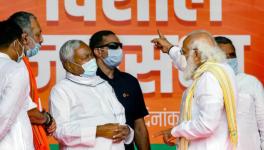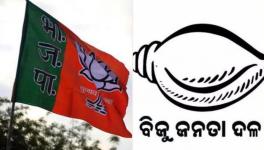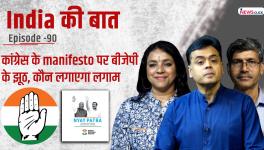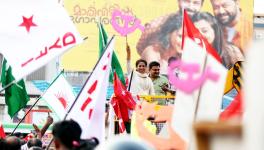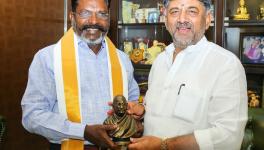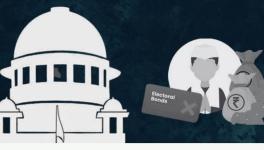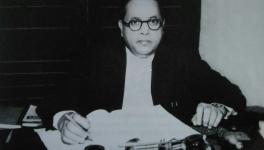Is 2019 a Turning Point For Indian Democracy?
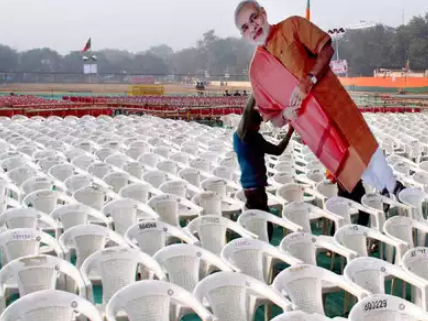
Image Courtesy: Navbharat Times
Every election is a spectacle in India. Some feel it resembles a festive season, while others feel it is akin to a change of season. Whatever be the festive aspect of elections in the past, the one in 2019 looks less like a festival and more of a grim battle that is either going to set many things right about Indian democracy or some fear there may not be another free and fair elections if Narendra Modi is to come back with the support of Rashtriya Swayamsevak Sangh (RSS). Whatever might be the veracity of such claims, it is important to note in what ways 2019 is significant, compared with general elections in the past.
The year 2019 highlights the paradox of a democracy, where the Congress with 44 seats continues to feel, talk and campaign like those in power, while the Bharatiya Janata Party (BJP), in spite of being in power in 18 states, continues to behave like an opposition party. In spite of gaining majority and propounding muscular majoritarianism, BJP seems like an underdog struggling to find space in the imagination of the Indian electorate. Not just its campaigns, but the entire mode of governance in the last five years was a case in point to demonstrate that BJP, in many ways, is an `outsider` to political power. It simply does not have an idea about governance, neutrality, policy-making; it only has a singular imagination gained from early training in the RSS shakhas (drills) of treating every difference as a threat and every individual with a difference of opinion, as an enemy.
During the past five years, ministries to universities have been pushed to the brink of a crisis. The nature of crisis slipped from bizarre to obnoxious, with the Governor of Jammu & Kashmir claiming that his fax machine was not working during the weekend; files went missing from the ministry, then it was said they were never lost but only a photostat copy was lost; the Comptroller and Auditor General’s report was not presented to the court and it was claimed it was a typo; Data about employment was systematically fudged or suppressed; the chartered accountants organisation replied on behalf of the government, while the NITI Aayog released the statistical data of the government. There were a series of resignations from the Central Bureau of Investigation, to the Reserve Bank of India, to the chief of National Statistical Commission, to a protest press meet by the judges of the Supreme Court.
Was this mode of governance a result of a genuine lack of experience or was it a deliberate mode of subverting institutions? Will institutional mishandling matter in deciding the electoral prospects? What would be the next step in subverting institutions if BJP is to come back to power in 2019? On the other side, will the results have a long-term impact of how Congress visualises itself? Will the results change the self-assured imagination of Congress as a national party and a party by default in power? Will the narrative change, perhaps, for the first time in post-Independence period where the Congress, alongside the regional parties can assume the status of an underdog?
Will it also change the ideological character of the Congress? It is for the first time that the BJP has come to power with such a brute majority and the implications are there for everyone to see, including the machinations of `deep state` behind the scenes. The well choreographed optics and narratives revealed how well organised and well-oiled were the organisational machinery of the BJP-RSS combine.
While, the Congress remained a `decentralised` party, mostly `outsourcing` its official posts to individuals with money power and ability to win elections on their own. It led over a period of time to crony-character of its public representatives, those mostly belonging to a contractor class with the typical characters of middlemen that served the continuation of family-rule well. It worked out to be a two-way arrangement. Has the Congress under Rahul Gandhi realised that this is no longer a feasible model, and will 2019 turn Congress into a more robust ideological party, or will it see more desertions and shrinking of its appeal at the national level?
The year 2019 and its follow-up time is also significant in deciding the future of BJP. Is it possible that the post-Modi era of BJP will mark its terminal decline? While Modi represented its peak, he was also its mascot to implement the core agenda of the RSS, and it is for first time that people got a first-hand experience of what a Hindu Rashtra will look like and how it will be ushered in? Even if the majority of people have not made complete sense of it, it has opened the doors with Modi using every `strategy` available. This included spreading fake news, to intimidation and fear, complete control of the media houses and full alignment with chosen corporate houses and moving towards a model of not just crony but also monopoly capitalism.
The instrumentalisation of politics was on full display with narratives being spun without evidence or even an attempt to make them look real. People may not have made full sense of it, but have a nagging doubt about the alliteration of the optics, and as Karl Marx said ‘history repeats itself, first as tragedy, second as farce’. The tragedy is what constituted Modi’s first term; will the second be a farce?
Many political leaders have already questioned the veracity and timing of many incidents in the recent past. In addition to this, Modi`s style of functioning not only not encouraged local leadership but wantonly destroyed the credibility of its second-rung leaders, most of them looking like caricatures of themselves. Other than Uttar Pradesh Chief Minister Yogi Adityanath, who the party has been projecting but failing to get traction, BJP has no credible national leader. Even if they manage to find one, most of the tactics have been exhausted by Modi. Merely repeating them will not hold the interest of the electorate.
Politics and history is all about robust possibilities, we will be witness to the making of this history after 2019. Which of the directions it is set to take, will be decided in the next month or so.
The writer is Associate Professor, Centre for Political Studies, Jawaharlal Nehru University, New Delhi. He recently authored ‘India after Modi: Populism and the Right (Bloomsbury, Delhi, 2019). The views are personal.
Get the latest reports & analysis with people's perspective on Protests, movements & deep analytical videos, discussions of the current affairs in your Telegram app. Subscribe to NewsClick's Telegram channel & get Real-Time updates on stories, as they get published on our website.









